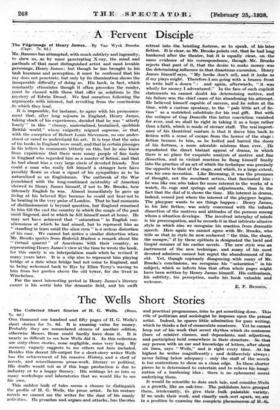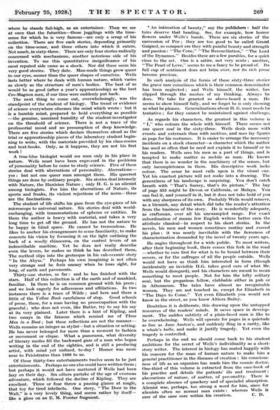The Wells Short Stories
ONE thousand one hundred and fifty pages of H. G. Wells's short stories for 7s. 6d. It is amazing value for money. Probably they are renumbered stereos of another edition, otherwise Messrs. Henn could hardly have done it. It is nearly as difficult to see how Wells did it. In this collection are sixty-three stories, none negligible, some very long. My .memory vaguely suggests to me others not here included. Besides this decent life-output for a short-story writer Wells has the achievement of his massive History, and a shelf of novels, and miscellaneous prose-work, literary or political. His drafts would -tell us if this huge production is due to industry or to a happy fluency. His writings let us into so many workshops and laboratories that we would like to see
his own. • This sudden bulk of tales seems a chance to distinguish the profile of H. G. Wells, the prose artist.- In his mature novels we cannot see the writer for the dust of his manly activities. He preaches and argues. and- attacks,- has theories
and practical programmes, tries to get something done. This role of politician and sociologist he imposes upon' the primal artist. Indeed, he spares- little admiration for pure writing, which he thinks a fad of emasculate amateurs. 'Yet he cannot keep out of his work that secret rhythm which its. sentences (bare of relative clauses, and dependents, and adjectives, and participles) hold somewhere in their structure. So that any person with an ear and knowledge of letters, after about six lines, says " Wells," and is right every time. At =his highest he writes magnificently; and deliberately always; never falling below adequacy : only the stuff of the novels is too contentious to show us a clean edge. In these, shorter pieces he is determined to entertain and to relieve .hislimagi- nation of a burdening idea : there is no ephemeral moral underlying them.
It would be scientific to date each tale, and consider-Wells as a growth, like an oak-tree. The publishers.have grouped them, irrelevantly, to give their bulk palatable variety. If we undo their work, and classify each sort apart, we are in a position to examine the complete phenomerion.ef kleRa where he stands full-high, as- an entertainer.- Then we see at once that the futurities—those jugglings with •the time- sense for which he is very -famous—are only a scrap of his collection.- There are five such stories, depending primarily on the -time-sense,- and- three- ethers into which- it enters. Not much, in sixty-three; There-are only four stories radically concerned with- mechanisms,- another notorious -side of his invention. To -me this quantitative insignificance of his • most reputed- side -came as a shock. Nor did these seem his very good stories. They date. - Man-made things grow queer to our eyes, sooner than the queer shapes of ourselves. Wells -lasts -better where- he deals with human -nature, which varies as slowly as -the structure of men's bodies. The- best of us -would- be as good- (after a year's apprenticeship) as the best
Cro-Magnon men, if our time were'suddenly put back. -
• The next thing to come out, 'overwhelmingly, was the standpOint of-the student of biology. -The trend or evidence of science everywhere obsesses the mind which wrote : but it -is a humble mind, prepared to hold everything as possible —the genuine, unmixed humility of the student-investigator on the threshold of science. There is not a trace of the professorial mood and no presumption of deep knowledge. There are five stories which declare themselves aloud as the trial or apprenticeship- pieces of the -laboratory -student begin- ning to write, with -the materials provided by his class-rooms and- text-books. Only, as it happens, they are not his first work I
• A true-blue biologist would see man only in his place in nature. Wells must have been engrossed in the problems of personality before he eame to study science. Five of these stories deal with aberrations of personality. Aberrations— yes : but not one queer man amongst them. His queerest things are done by ordinary people. Six stories deal intensely with Nature, the Huxleian Nature ; only H. G. is an alienist among biologists. For him the aberrations of Nature, its sports and freaks, its violent rejections of the norm—these are the fascinations.
The student of life shifts his gaze from the eye-piece of his microscope to universal nature. Six stories deal with world- exchanging, with transmutations of spheres or entities. In them the author is heavy with material, and takes a very long time to get off the ground. He has not the nature to be happy in blind space. He cannot be tremendous. He likes to anchor his strangenesses to some familiarity, to make concrete his vision by focussing it on the light outlining the back of a woolly rhinoceros, on the control levers of an indescribable machine. Yet he does not' really describe even the levers, he makes us- think he has deseribed them. The method slips into the grotesque in his sub-oceanic story " In the Abyss." Perhaps his own imagining is not often very strange and he feels uneasy when he loses sight, for long, of earth and pavements.
Thirty-one stories, so far : and he has finished with the stars. Half of this collection is of the earth and of mankind, familiar. In them he is on common ground with his peers ; and we look eagerly for adherences and affiliations. In two instances there is a trace of Wilde ; and here and there a little of the Yellow Book carefulness of step. Good schools of prose, these, for a man having no preoccupation with the graceful ; who does not even, like Butler, try to say his say at its very plainest. Later there is a hint of Kipling, and two essays in the fatuous which remind me of Three Men in a Boat; but these reflections are not the manner— Wells remains an integer as stylist—but a situation or setting.
He has never belonged for more than a moment to fashion or movement or clique. What a panorama, what diversity of literary modes fill the backward gaze of a man who began writing in- the end of the eighties, and is still a producing artist, with mind yet unfixed, to-day ! Homer was more near to Peisistratus than 1886 to us.
Of these thirty-two entertainments twelve seem to be just entertainments. Perhaps no one else could have written them ; but perhaps it would not have mattered if Wells had been lazy on their day. Six others partake of the age of overseas adventure, which followed the decline of Kipling. They are excellent. Three or four throw a passing glance at magic, that toy for tired intellects. One story, " The Door in the Wall," is a very lovely thing, and seems rather by itself— like a glom on an E. M. Forster fragment.
"4 An intimation of beauty," say the publishers : half the tales deserve -that heading. See, -for example, how horror flowers under -Wells's handi. There are six stories of the - succession of -Poe ; -they are too good to be called Grand Guignol,•so compact are they with painful beauty and strength
• and passion : "The Cone," " The Reconciliation," " The Lord of the Dynamos." Besides these are a few parables, for a quiet -close- to the set. • One is a satire, not very acute ; another, "The Pearl of Love," seems to me a fancy to be proud of. Its full cup of sentiment does not brim over, nor its rich prose precious. . . _
In such analysis of the forms of these, sixty-three stories the grave rare comeliness which is their common denominatOr has been neglected ; and Wells himself, the writer, has slipped through the meshes of my thinking. Always he does. We take for granted so above-board a man. He seems. to- show himself fully, and we forget he is only showing m us what hipleases. Generalizations about H. G. must needs be tentative ; for they cannot be maintained against challenge.
As regards his characters, the greatest in this volume is " I," who colours the whole with himself.. There seems_not one queer soul in the sixty-three. Wells deals more with events and externals than with motives, and uses lay figures as pegs for his costumes. It is easier to arrange the necessary incidents on a stock character—a character which the author has used so often that he need not explain it to himself or to his readers. Wells sees his men as a part of things, and is tempted to make matter as mobile as man. He knows that there is no wonder in the machinery of the senses, but only incompleteness in them. His descriptive work lacks colour. The sense he most calls upon is the visual ooe. Yet his exactest picture will not make into a drawing. The generalness of his landscape is surprising. You don't catch breath with " That's Surrey, that's its picture." The bay of page 355 might be Devon or California, or Malaya. You can feel it, and yourself in it, but it does not take hold of you with any sharpness of its own. Probably Wells would remove, as a blemish, any detail which did take the reader's attention from the business of the story. He is wonderfully adequate, as craftsman, over all his unexampled range. For exact subordination of means few English writers better earn the attribute classical—in respect to his short stories. In the novels, his men and women sometimes mutiny and exceed his plan : it was nearly inevitable with the fierceness of characterization demanded by the novel of twenty years ago.
He angles throughout for a wide public. To most writers, after their beginning book, there comes this fork in the road --whether to care first for what is to be bound between their covers, or for the suffrages of all the people outside. Wells would not have us think him interested in form (though incidentally an invisible H.G. takes good care of what Mr. Wells would disregard), and his characters are meant to mean something to most people. Not for him the lofty solitary soul, but the gregarious fellow, clubbable either in pub or in Athenaeum. The tales have almost no recognizable women. They are not touched in, except for Elizabeth in "The Days to Come." Yet even Elizabeth you would not know in the street, as you know Altiora Bailey.
Doubtless it is deliberate, this drawing upon the-untapped resources of the readers' minds. It saves space in develop- ment. The sudden subtlety of a plain-faced man is like to be overwhelming. Wells will operate for pages in a quietude as fine as Jane Austen's, and suddenly fling in a rarity, like a whale's bulla, and make it justify tragedy. Yet even the tragedy is controlled.
Perhaps in the end we should come back to his student ambitions for the secret of Wells's individuality as a short- Story writer. The interest in biology has mated happily with his concern for the mass of human nature to make him a general practitioner in the diseases of creation : his conscious- ness of life as an organism has made him the cosmic doctor. One-third of this volume is extracted from the case-book of his practice and details the patients' ills and treatment : aberrations of nature, of matter, of personality. There is a complete absence of quackery and of specialist absorption. Alienist was, perhaps, too strong a word for him, since for alienists often no normal man exists : whereas Wells is sure of the sane core within his creation. C. D.









































 Previous page
Previous page